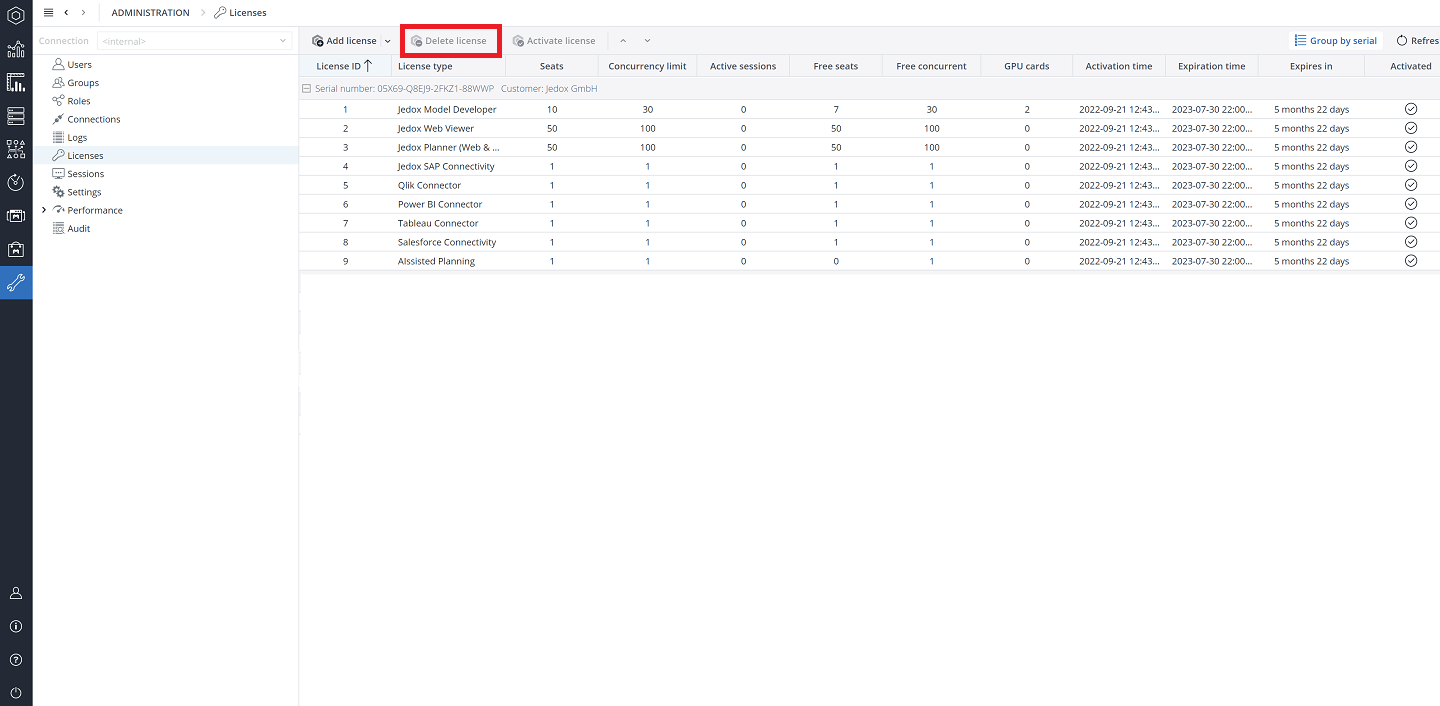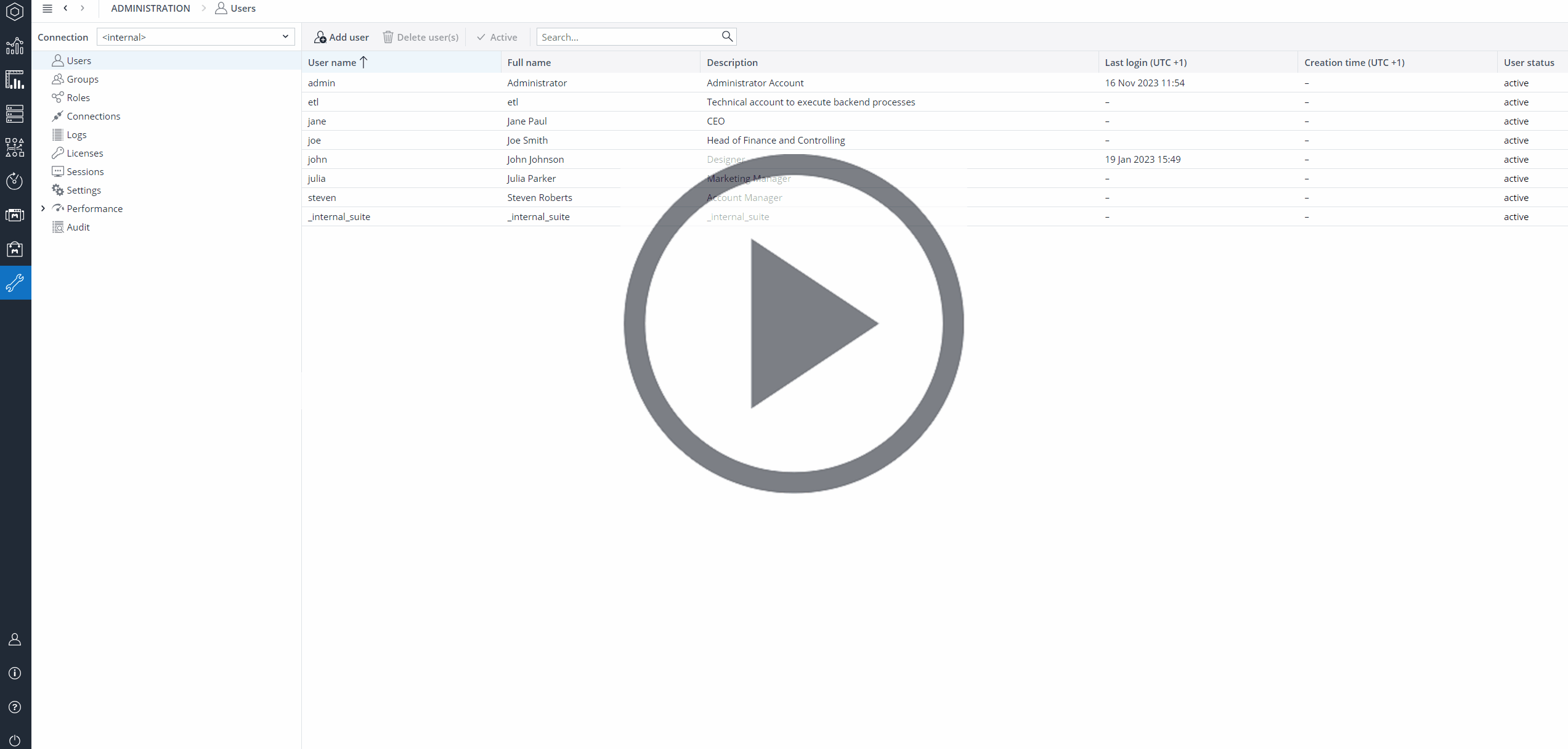 How many users can log on to Jedox at once?
How many users can log on to Jedox at once?
The number of users who can log on to Jedox is capped by the number of concurrent users. These numbers can be found in Jedox Web Administration under Licenses. The Free Concurrent column shows how many concurrent ports are available, i.e., how many more users can log on at the moment.
The screenshot above shows a Jedox Suite Full User License with 5 seats. Every seat has 3 concurrent access ports. Two seats are given to named users. Currently, one of these users is using one access port (see Active Sessions) and there are 14 free concurrent access ports for this license.
 Can I use MS Excel, a mobile device, and Jedox Web in a browser at the same time? If so, how many licenses do I consume?
Can I use MS Excel, a mobile device, and Jedox Web in a browser at the same time? If so, how many licenses do I consume?
A user can log on via multiple clients at the same time. The license that is assigned to the user has to include the clients. For example, not every license includes the use of Jedox Excel Add-in.
When using multiple clients at the same time, each session consumes one concurrency port on the license to which the user is assigned. For example, if a user logs on to the Jedox Server from both Jedox Excel Add-in and Jedox Web, then two concurrency ports are being used at that moment. There is no limit to how many concurrency ports a single user can use, other than the overall limit of concurrent license ports for the license assigned to the user, minus the number of other, parallel user sessions.
 If I'm not using Excel, does the concurrent license free up for someone else to use?
If I'm not using Excel, does the concurrent license free up for someone else to use?
By default, sessions on the Jedox OLAP Server time out after 5 minutes of inactivity. The server checks for expired sessions once per minute, so the session may remain active for up to 60 seconds after the timeout. The length of the timeout is configurable on the OLAP Server.
If a user is logged on to Jedox Excel Add-in and is not actively using the session (that is, using Excel reports that show OLAP data, or using Jedox Excel Add-in dialog), the configured session will time out after these 5 minutes. The user's concurrency port then is available to another user.
Once the user is active again in Excel (for example, when recalculating the report), Jedox Excel Add-in will silently try to create a new session, as long as there are concurrency ports available. If the user had not saved credentials in his OLAP connection, they would then be prompted to enter their credentials.
 If I leave Jedox Web running in a browser, or Jedox Mobile running on my phone, does the concurrent license free up for someone else to use?
If I leave Jedox Web running in a browser, or Jedox Mobile running on my phone, does the concurrent license free up for someone else to use?
By contrast to Jedox Excel Add-in, Jedox Web actively keeps the running session active, even if there is no user activity. As long as the user is logged on, the concurrency port used for the web session will be in use and not free to be used by someone else.
In the Jedox Mobile app for iOS, the OLAP session will time out after a period of user inactivity, even if the user remains logged on (due to restrictions of the iOS platform). By contrast, in the Jedox Mobile app for Android, the session is kept alive even if the app is running in the background with no user activity.
 What are the <SupervisionServer> and _internal_suite users in the Administration > Sessions? Do these users consume licenses?
What are the <SupervisionServer> and _internal_suite users in the Administration > Sessions? Do these users consume licenses?
Both the <SupervisionServer> and _internal_suite sessions are used for internal purposes by Jedox processes. Their sessions in the OLAP server are created automatically, but they do not count toward concurrency limits when used for internal processes. Note that _internal_suite is a technically a user, with name and password, and those credentials can be used to log in to Jedox. In that case, it would consume a license seat, like any other user.
 How can I see how many times my license has been activated?
How can I see how many times my license has been activated?
The information how often a license has been activated is not available in the Jedox User Interface. If the license activation limit has been reached, any further activation attempts will result in an error message. If you want to find out how often your purchased Jedox License has been activated, you can contact Jedox Support.
 I need to move my database to a new server. Will my old license key work?
I need to move my database to a new server. Will my old license key work?
An activated Jedox License is bound to the hardware it was activated on. The license will not work on new hardware. In this scenario, the license has to be activated again.
 Do Integrator jobs that access the In-Memory DB Server consume license concurrency ports?
Do Integrator jobs that access the In-Memory DB Server consume license concurrency ports?
If an Integrator job uses a connection to Jedox In-Memory DB Server, it will create a session in the Server (with the user as defined in the Integrator project). However, this session does not count against the Concurrency Limit of the license.
Updated July 3, 2025


